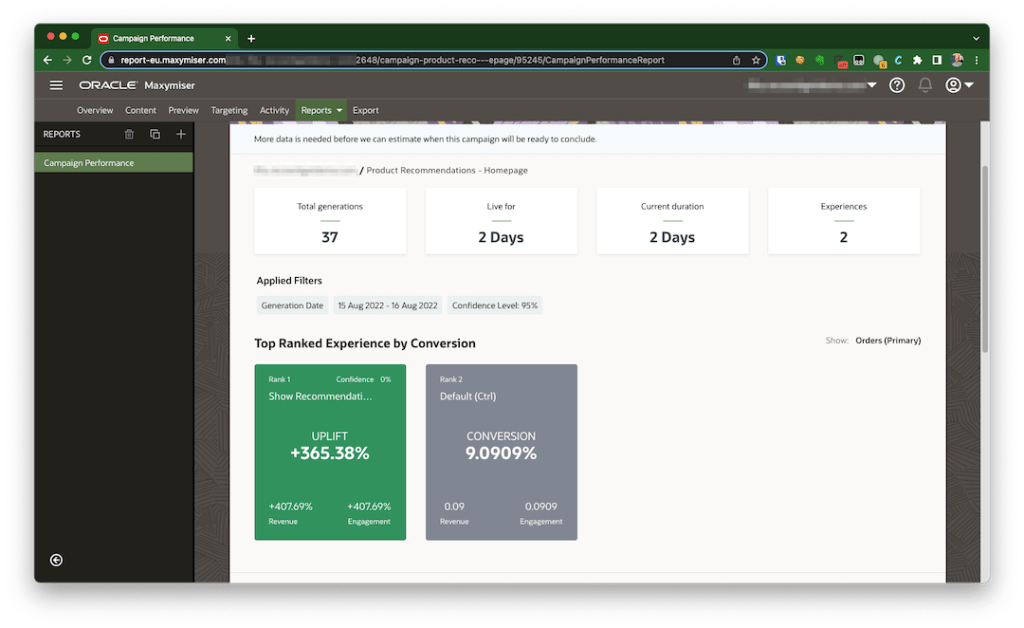Using the Power of Infinity Recommendations to Increase Customer Engagement
In a previous blog post, we reviewed Oracle Infinity in depth. That post discusses Oracle Infinity IQ and how it “takes behavioral analytics to the next level, applying intelligence to your real-time analytics.” Infinity IQ allows companies to understand their customers’ signals by applying intelligence to real-time digital behaviors and optimizing the customer journey on the fly with recommendations, personalizations, and predictions, all while the customer is engaged with your website, app, or email.
Infinity IQ combines the power of Infinity Streams, Infinity Analytics, Maxymiser, and Recommendations to enable a full solution for behavioral intelligence. In this post, we are going to hone in on Infinity Recommendations.
What are Infinity Recommendations?
At its most basic definition, a recommendations engine is a type of data filtering tool that applies machine learning to your website and app visitor profiles to surface the most relevant content and/or product items to each customer during their journey. It functions by finding patterns in visitor behavior data to increase cross-sell and up-sell opportunities, increase online conversion rates, and enhance the customer experience with hyper-relevant content based on those discovered patterns.
Oracle Infinity Recommendations is an AI-powered recommendation engine that provides personalized content suggestions to website visitors based on their behavior and interests. This tool helps businesses increase engagement and conversions by delivering relevant content to your audience. If you are a business owner looking to improve user experience and drive revenue, Oracle Infinity Recommendations can be a valuable tool to consider.
How Does It Work?
Infinity Recommendations allows marketers to configure, deploy, and promote cross-channel content recommendations in real-time that are personalized for each customer. Using AI and machine learning (ML) algorithms, marketers can enable these recommendations across their entire martech stack, including both Oracle and non-Oracle systems.
With an easy-to-use interface, the Infinity Recommendations tool helps you insert a widget with the next-best and recommended content or product items on relevant web pages. The number of items and the information shown per item is also customizable. Once the items are created, you choose the appropriate ML model and apply any desired filters to target your audience with the most appropriate recommendations.
This also includes the ability to personalize styling, display positioning, and which strategy model to use as well. Then, once your campaign has launched, Infinity Recommendations provides in-depth campaign reporting so that marketers can understand and manage the performance of your recommendations.
The image below shows an example of Infinity Recommendations working using a “Last Viewed” strategy to show additional products for the customer to consider based on the website items they last viewed.
Why use Infinity Recommendations?
There are many advantages to using Infinity Recommendations. The automatic recommendations are undoubtedly the primary use case allowing marketers to display the best product and content suggestions to their users using a variety of strategic models. Additionally, using Infinity Recommendations can increase revenue on your websites, mobile applications, and emails by improving conversion rates. Providing intelligent next choices aids your customers in making selections and streamlining their experience to accelerate the purchase cycle.
Another benefit of using Infinity Recommendations is that it can be deployed on the web, mobile applications, and email through standardized integration methods, or quite literally anything using its API. Augmenting this benefit is the fact that, after the initial deployment, recommendations can be included anywhere on your website without any additional development work.
Lastly, marketers have a way to measure incremental orders, revenue, or uplift in conversion by utilizing out-of-the-box reporting. For example, utilizing the Campaign Performance Report allows marketers and company leadership to understand the uplift in conversion produced by the Infinity Recommendations campaign and make adjustments to it in real time, as needed. Using these results, marketers can create more look-alike models that amplify the user experience for maximum conversion, engagement, and revenue.
How Do You Get Started with Infinity Recommendations?
To get started with Infinity Recommendations, marketers need to create their Recommendation strategy. There are three parts to a Recommendation strategy:
- The algorithm that produces the recommendations
- Filters to curate the item and content recommendations based on recorded attributes of those items and content components
- Fallback items will be promoted if there are no items that meet the algorithm and filter criteria
There are several Recommendation models and algorithms that marketers can use to reach the desired outcome: Popularity-based models, co-occurrence-based models, and User-history-based models. Oracle’s Infinity Help Center provides a robust table explaining in-depth each of these model types and the algorithms they use.
Briefly, the Popularity-based models are designed to return recommendations for items that are most frequently viewed and/or purchased to accelerate more look-alike purchases. The co-occurrence-based models return items that are most frequently viewed and/or bought together with the item that the user is currently viewing, and the User-history-based models promote the last items that a user viewed or similar items.
Even with all the robust calculations running in the background, marketers still need to create fallback items if the filter criteria do not produce any results. These are standard or commonly recommended items that marketers pre-select as the “default” to promote. This comes in handy when customers don’t have any known view or purchase history with your website, or when there are no items that match the marketer’s campaign recommendation filter criteria. Regardless of the reason, having fallback items ensures that some quality items and/or content are always displayed to your visitors.
As you can tell, this is a lot of power for just one component of Oracle Infinity IQ! We encourage you to visit Oracle’s Help Center to read more about Oracle Infinity and Infinity IQ and deep-dive into Infinity Recommendations for more detail. And when you’re ready to get started implementing or building out your Recommendations strategies, we are here to help. Reach out and experience the power of Infinity Recommendations for your organization.
Thank you for subscribing!



